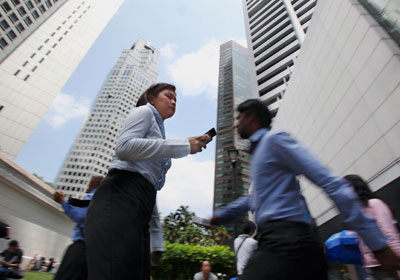

Singapore appears to be the place in Asia that bridges the East and the West perfectly. Business seems to run smoothly in the city-state that’s cleaner and better organized and regulated than most Western financial centres. Does this mean that Singaporeans have come to think like Westerners, or is it simply part of their preferred business model to accommodate global business In a Western manner?
The Asian way
Singaporeans are hard workers and generally fluent English speakers. They conduct business effectively and are fairly straightforward by Asian standards. Therefor Western managers and business people may easily assume that cultural differences are not that relevant here.
But Singapore is not a western country. It’s made up of a mix of Asian cultures; the Chinese being the most influential. Typical Asian values like the importance of “face”, family, hierarchy and a strong “group-think” are very much part of Singaporean culture. Behaviour may appear western on the outside, but on the inside these values are still key drivers.
Singapore’s current international success was created a mere 50 years ago based on the vision of its pragmatic Chinese founding father Lee Kuan Yew and supported by the economic plan written by Dutch economist Albert Winsemius. Even today its society resembles a family run by the father figure, e.g. the prime minister (LKY’s eldest son, still mentored by his aging father). Its operations are like those of a company with dedicated and loyal workers following directions from upper management. Because of the limited available resources and space (5,4 million people on 710km2) combined with an international mixture of citizens clear and efficient policies are required and accepted.
Great go-betweens
As a result of their unique background Singaporeans are well positioned to deal with Western and Asian partners alike. Oftentimes it’s a Singaporean that has a key role in bridging western and local Asian business interests. Take the following case whereby a Vietnamese customer complained about the product quality delivered by a Swedish manufacturer. According to the Vietnamese customer the Swedish product failed in perform. The Singaporean distributor suspected that the Vietnamese had been trying to change the product upon installation. He also knew that he couldn’t accuse the Vietnamese of lying about it as that would create loss of face and end the business relationship. He realised the Swedish were probably right in stating that the product left their factory in good order since he experienced they generally do. Ultimately, the Singaporean distributor decided to personally take the loss, thereby saving the longer-term business relationship with both parties.
Business in Asia
Service is an ingrained Asian trade and Singapore truly has made it its business to maximize it. Initial contacts for you as an expat manager, business traveller or agent might appear effortless but if you want get the best out of your local employees or business relationships you need to understand the tapestry of Asian values that’s underneath the surface. Without this understanding you might run into challenges connected to responsibilities, hierarchy or general expectations that you never saw coming because it seemed you were all talking the same language…



